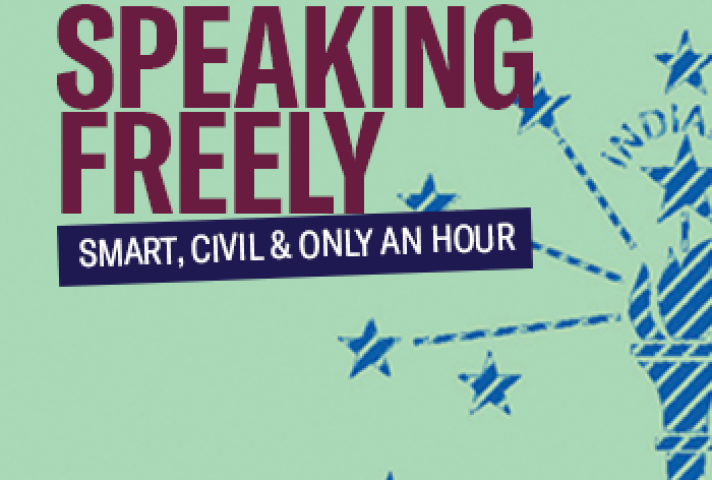The ACLU of Indiana's Speaking Freely series, formerly known as First Wednesdays, aims to involve communities across the state of Indiana in important conversations about civil liberties in the Hoosier state and across the nation.
Past Events
Confront the growing need for a revolution in the criminal justice system –a system that has evolved to focus on punishment rather than rehabilitation. Art exhibition and panel discussion featuring criminal justice reform experts and individuals affected by the prison system.
After an opportunity to view art created by those affected by the criminal justice system, guests are invited to participate in a panel discussion. The panel will explore the history of America’s criminal justice system, the economic and racial impact of incarceration and reform efforts throughout Indiana and across the Nation. In addition, the panel will look at the values that shape the justice system, as well as the role religion plays both inside the system and in wider society, in shaping community values around welcoming people who have been formerly incarcerated back into communities.
Speaking Freely: LGBTQ Life in the Trump-Pence Era
Wednesday, July 17, 2019 at 7pm
Merrillville Branch of the Lake County Public Library
Five years ago, we won marriage equality in Indiana, marking a major milestone for the LGBTQ community – but since then, the LGBTQ community has faced an onslaught of discriminatory policies from the Trump-Pence administration. These policies have particularly targeted trans individuals. From the trans military ban to religious refusal policies that increasingly threaten access to medical care, these policies are an outright attack on trans rights. Hear from Hoosiers who are on the front line fighting these policies, as well as LGBTQ community members and advocates who are working on the ground in Northwest Indiana. Learn about the challenges presented by Trump-Pence policies, the implications for LGBTQ Hoosiers, and what you can do to support and defend LGBTQ people in Northwest Indiana.
Speaking Freely: Fighting for Rights in the Statehouse
Wednesday, April 3, 2019 at 7pm
Indiana University Ballantine Hall – Room 109
Bloomington, Indiana 47405
The ACLU of Indiana will hold a Speaking Freely panel on the "Fighting for Rights in the Statehouse." The panel will discuss current bills in the Indiana Statehouse, how they impact Hoosiers' rights and what students can do to take action. The panel will focus on criminal justice reform, hate crimes legislation, repro rights, immigration rights and lgbtq rights.
Panelists:
- Jeannine Bell, IU Maurer Law Professor
- Katie Blair, ACLU Indiana Advocacy and Public Policy Director
- Dan Canon, civil rights lawyer and former Democratic candidate for Congress
Moderated by:
- Michael Grossberg, ACLU of Indiana Board Member
Speaking Freely - Butler University Founder's Week
Wednesday, February 6, 2019 in Eidson Duckwall Auditorium, Butler University, Indianapolis
As part of the Butler University Founder's week event, the ACLU of Indiana will host a Speaking Freely panel on the "Rights for Everyone." In keeping with the Founder's Week theme, "BU Be You," the panel will discuss the legal rights and challenges to being yourself. The panel will focus on groups whose rights have been historically under attack such as immigrants, lgbtq folks, religious minorities, women and people-of-color.
Panelists:
Kit Malone
Activist and Educator, ACLU of Indiana
Aliya Amin
Executive Director, Muslim Alliance of Indiana
Guadalupe Pimentel Solano
Vice President of Indiana Undocumented Youth Alliance
Moderated by:
Terri Jett
Board President, ACLU of Indiana
Community Partner:
Women4Chnage Indiana
How do we balance minority and majority rights? America's history is full of intersections where the rights of the minority conflict with the rights of the majority. Where the promise to protect individual liberty conflicts with the promise to protect our communities from harm, foreign and domestic. Join the ACLU for a moderated conversation about the intersection where competing rights, and competing values, must be resolved. We will look at topics such as immigration and President Trump’s travel ban, as well as RFRA and LGBTQ rights—all while considering the diverse country we live in and how we can best work to find the right balance that will keep all Americans free, safe and equal.
Yes! You Can Vote!
September 19, 2018 at the Elkhart Public Library
With the November elections just around the corner, the panel will break down misconceptions surrounding who can and cannot vote in the state of Indiana, answering all of your questions about registration, absentee voting, the most recent Indiana voting laws and more. The event will be hosted by the American Civil Liberties Union of Indiana in partnership with the NAACP Elkhart Branch.
RSVP on Facebook to get notifications and event updates!
Panelists:
Lisa Koop, National Immigrant Justice Center Associate Director of Services
Dwayne Brown, ACLU of Indiana TEAP Advocate
Arvis Dawson, Elkhart County Election Board Member
